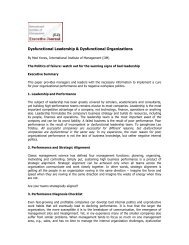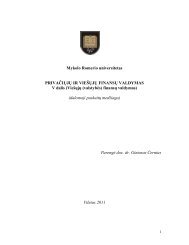Happiness Formulas - Subjective well-being: Institute of subjective ...
Happiness Formulas - Subjective well-being: Institute of subjective ...
Happiness Formulas - Subjective well-being: Institute of subjective ...
You also want an ePaper? Increase the reach of your titles
YUMPU automatically turns print PDFs into web optimized ePapers that Google loves.
such thing as cultivating our small fenced garden in a vacuum: it depends on<br />
how other gardens are, which seeds are carried around by bees, etc.<br />
Power <strong>of</strong> context<br />
We also need to understand strengths and weaknesses are never<br />
absolute, and always contextual: a shy person makes an ideal listener, and<br />
maybe not the most performing social butterfly. For this reason, shy people<br />
may put themselves in the contexts where they can facilitate happiness for<br />
them and other people; and also let themselves go in more social situation.<br />
Still, happiness is more building in strengths, and not force ourselves in<br />
filling what we see as voids.<br />
We can change: Neuroplasticity and Neurogenesis<br />
Science discovered that our brain can be rewired (neuroplasticity).<br />
And not only that, new neurons can be generated (neurogenesis). At any age,<br />
and in almost every condition. Of course, there are some stages <strong>of</strong> our lives,<br />
and certain conditions, where neuroplasticity and neurogenesis are<br />
facilitated more; still, how we think and what we do rewires our brain, and<br />
the way our brains are wired influence how we see the world and what we<br />
do. We can make this a virtual circle, supporting our growth as individuals<br />
and member <strong>of</strong> society.<br />
Being aware <strong>of</strong> awareness: consciousness matters<br />
Scientific research made giants steps toward a deeper understanding<br />
<strong>of</strong> consciousness. While we do not all need to be experts in neuroscience, an<br />
understanding <strong>of</strong> its discoveries can facilitate our happiness, making us more<br />
aware <strong>of</strong> how our awareness works .<br />
Evolution explains a lot about our instincts<br />
Why, as individuals, our behaviour may be so unpredictable, but as<br />
“crowds” patterns are easy to spot? Because, among other reasons, there was<br />
an evolutionary advantage in following the wisdom <strong>of</strong> the crowd, especially<br />
in situations <strong>of</strong> emergency: if a member <strong>of</strong> the tribe was suddenly running,<br />
chances he/she spotted a potential source <strong>of</strong> food, or a predator who was<br />
ready to attack; and, in a relatively small community, it was easy for peers to<br />
know the odd case <strong>of</strong> a tribe-member who was always running for no reason.<br />
Why is sex so <strong>of</strong>ten present in our minds? Because most <strong>of</strong> the <strong>being</strong>s<br />
with low libido are, <strong>well</strong>, extincted due to lack <strong>of</strong> <strong>of</strong>f-springs.<br />
Meme explains a lot about our customs<br />
Meme is a label used to identify units <strong>of</strong> cultural ideas, symbols or<br />
practices; meme are, by their own nature, transmittable from one mind to<br />
another. This means that customs which are easily transmissible in a given<br />
context, are likely to stick around for long regardless <strong>of</strong> their degree <strong>of</strong><br />
www.iswb.org Page 33




